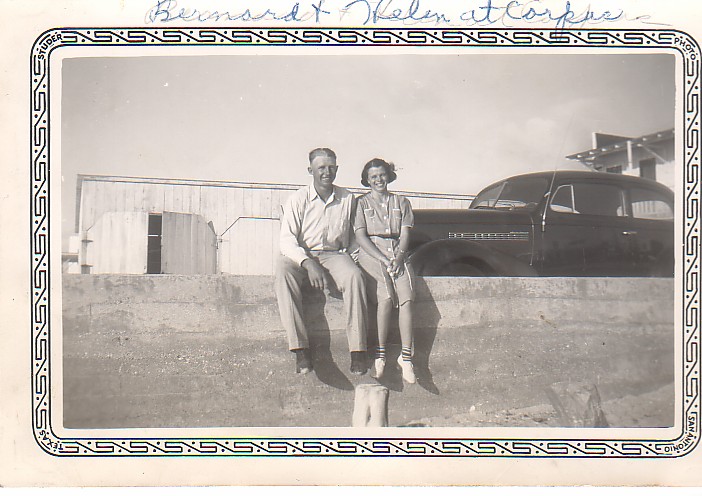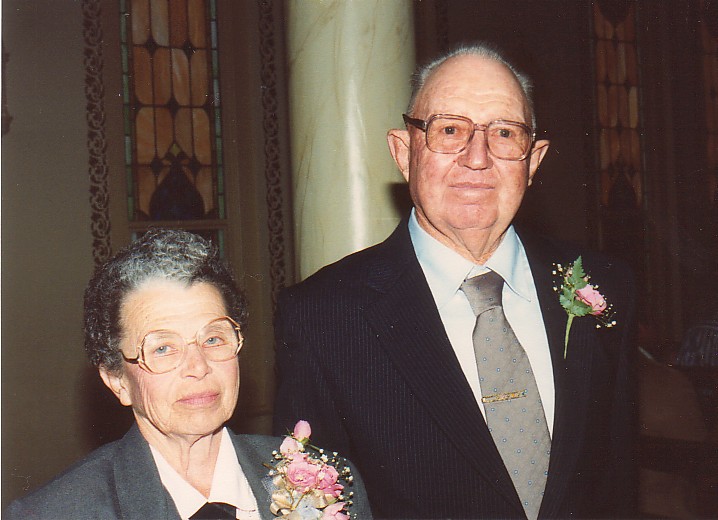
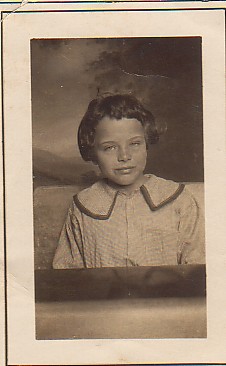
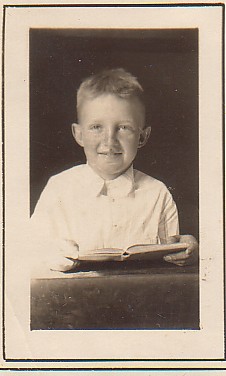

Where did you grow up?
Helen: In Castroville , on highway 90.
What school did you go to?
Helen: St. Luis Catholic School in Castroville walked three miles to school and three miles home. At that time we made our first communion and then when we were 12 or so we made our solemn communion. I had to walk to Castroville by myself on Highway 90 at that time all those trees and things were still growing it was not cleaned out the pastures. And on the way home a car stopped and he said that he wants to give me a ride, and I said no my daddy said that I couldn't go with anybody I had to stay, he said don't worry I will take you to your house and tell your daddy that I am the sherrif from Hondo. He had his pistol lying besides him. Ok I went in the car and he took me home and he told my daddy that I didn't want to go in the car, that was an experience. So that's that. I told you that we played baseball and stuff together. I told you that I had six brothers and two sisters. Why did you not go to school after the ninth grade?
Helen: My mother had a open leg, a vein opened up and it bled real bad and she couldn't be on it for two months and I had to stay home and take care of the gang. Then when they said that I could go back to school after two months I said no that I am not going back after two months I lost enough schooling. It was fun to take care of the kids. In the morning grandma would say kill some fryers for Helen to clean and cook for us. And here I had to clean a bunch of fryers cut them up, she said bring them to the bed and I'll help you cut them up. So we did that,and I had to fry all that chicken, I don't know how many there were but there was chicken a lot of chicken. There was a bunch of hungry boys. Okay did that then washed the dishes. Took care of the family and washed all that good stuff. That was a lot of my childhood.
Did you ever have to work in the fields?
Helen: Yeah, I guess I didn't really have to but I went with my daddy. And we cut off corn tops for the cattle and spread them out. One time we were even picking cotton and I had a big sack on my back and I said who put all this wire in the field and Grandpa said that's not wire it's morning glory's it had all those stems or vines and he said it's not wire it's morning glory's. I thought it was wire when I was picking cotton.
Did you ever have to miss school because of working in the field?
Helen: No. That I didn't have to do. One year I went to school without missing a day, I walked nine months and went to school. How I did it I don't know, but I know I got a certificate for it.
Did you help your mother make clothes or did she do it by herself?
Helen: My mother did not make clothes, my aunt Rosa always made our clothes. I mean we did make the underwear and things, but I mean Aunt Rosa did a lot of the sewing for us.
When you were little was the Great Depression a big influence on your life?
Helen: I guess I was almost to young to remember the depression . I was about 11. I guess we didn't really pay too much attention Mom and Daddy got whatever they could and we just hung in there I guess, but really I don't remember the depression. One year the corn froze it was knee high and my daddy birthday was April the 20th and he told us to get a sickle and cut it off at the bottom, it came out but didn't make any crop.
When you got older was there anything special that ya'll liked to do for fun besides baseball?
Helen: We didn't really have too much time we had to help get the eggs and feed the chickens and get wood in for the fire because we had a fireplace wood stove and study we studied by kerosene lamps.
When you and Grandpa started dating where did you go?
Helen: The first time we went to a show we double dated with Uncle Nela and Aunt Patsy we went to a show in Hondo. But don't ask me what the name was I was too excited, that's where we went. Mostly we went to shows we never went dancing but we did go to bingos and things like that. But we never went dancing.
What about Enchanted Rock?
Helen: Oh yeah we remember that we went with Aunt Patsy and Uncle Nela we wore high heels and the men wore suits on why I don't know but anyhow we went there we hardly make it up there but it was a nice walk. Then did we go someplace else?
Ok Grandpa,
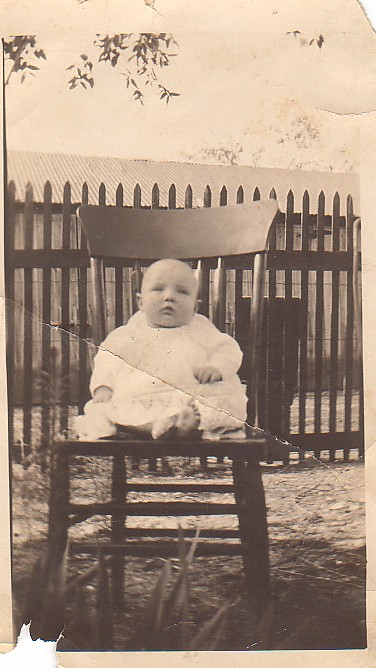
Bernard: In 1924 I was in Rio Medina and we got home and did the work Daddy milked the cow and I got the hay, something green
for the cow, pigs and a rattlesnake bit me there. They took me to Castroville, Doctor Brymer was the doctor. They called
in and said it was a little rattlesnake they found it. I told them I wasn't in the haybale, it was in the haybale they found it
I told them I wasn't in the haybale I was in the field. When we came home Daddy went to look and it was still laying there.
He got it, it had ten rattles and to this day I still got the rattles. There in a little box, he gave them to me one year.
I was pretty sick, nine days I was real sick they called the doctor he woke me up again. Grandma had give up already
but he shook me till I woke up. The doctor was 30 times by the house he treated me I don't know how many times
he was up there. Daddy paid the bill it was $175 all together.
Where were you living at the time?
Bernard: Where Patrick lives not in the same house but right there that's where I was bit. In 1932 we were cutting oats down we cut oats we cut it with the binder me and Daddy I drove the tractor and Daddy was on the binder. One afternoon there was a big cloud up north and Daddy made a motion like that (he waves his hand above his head in a circular motion) to drive faster to get to the end and meanwhile right after that a lightening struck right in between us. I fell front and he fell back, he got caught on his strap here and it drug him along a little piece till I saw it. He was pretty bad his shoulder was pretty bad for a while. They never found out where the lightening hit it was right between us I fell front and he fell back. Mabye that saved me from going faster if I fell back I would have been under the binder. In '41 we got married, we didn't have nothing, we had enough money to buy a car and that was about it. We made it, it didn't take a lot of money at that time, but we didn't make money either. In 1950 we had a big hail storm that knock everything out. We kept going, in the 50's it was the big drought, it lasted three or four years we didn't make nothing. Then in '57 it rain lot but it was soft moisture the stuff made pretty good, but it fell over it didn't have no roots. In '58 we had a tornado it took the house most of the house, but the crops were real good that year. some years we made good some years weren't so good stuff was cheep back then. If you had a twenty dollar bill you could go to the store two or three times and still have some left not like now you can't do that with a fifty. Gas was cheaper it was about .10 cents a gallon there was very little tax on it. But it gradually got a little higher. Tractors only cost around a thousand dollars if had a thousand bushels you could get a tractor, but now it takes fourty thousand bushels to buy a tractor and you still don't have enough.
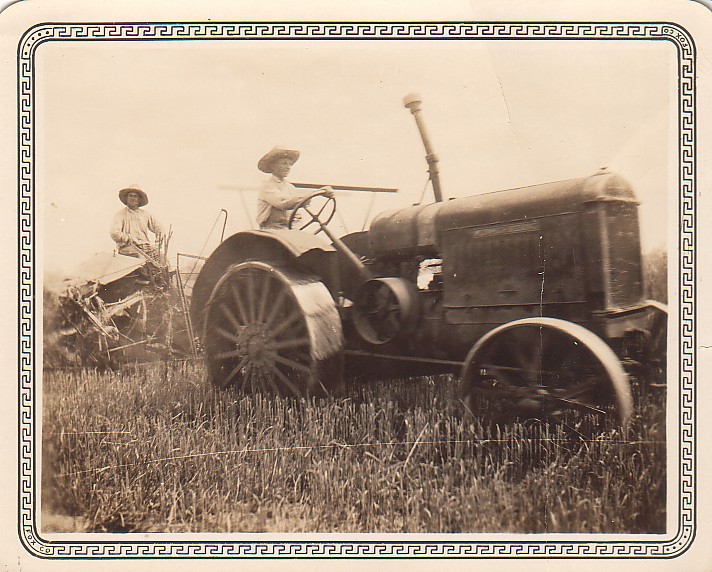
What was school like for you?
Bernard: School? I didn't like school. I only went through eight grades. It was all right but arithmetic and reading I was good but spelling I couldn't keep nothing just like your daddy. I didn't like spelling or history either Arithmetic I was good, reading I was good, I only went eight years. What I remember most they were digging a well by the school and we went with my cousin he wanted to go down so left him down there in the well. There was no one working on it when he was down there the priest came over to it and we all ran away, one after one you stay down there the priest is coming, and Edward said what should I do I can't get out, so the priest never went to the well he left when the priest was gone we went back and lifted him out. One time Edward was throwing rocks and he threw it far enough that it landed in a spanish people's house. When the priest came he made us all write five hundred line I am a liar. I didn't write it all, Edward said skip some you don't have to write em all. I didn't lie, but that is what he said we had to write down I'm a liar five hundred lines. I don't remember much school I only completed eight grades.
Did you miss school to work in the field?
Bernard: Some yeah, the last year I stayed home to help cultivate we didn't have to skip school to help much but in the evening we had to milk cows and stuff. We went the buggy and horse to school.
What school did you go to?
Bernard: Our Lady of Grace, two story building the teachers lived on top and the bottom had room for teaching.
What kind of games did you play when you were little?
Bernard: Games? Oh, we played a lot of baseball together with our neighbors, well sometimes we played hide and seek baseball in the daytime we that what usually played. Later on we in the evening night we went coon hunting but we always took sausage along to cook and usually stayed till twelve o'clock or sometimes later but we didn't find many coons but we found some and but we went anyhow and fishing too and sometimes we caught quite a few but sometimes, never no big ones not like they catch now. I guess that's about all, we had to work a lot when we stayed home we helped Daddy cultivate with the mules and work in the field. nine mules I guess along the road. some years good crop and some years nothing.
Did you get along with your neighbors the kids?
Bernard: They were just girls, so we didn't go over there much. Well yeah, they were about half a mile from us and we got along good.
What about the snowball fight?
Bernard: There was one time that I know that we had snowballs when we were young when we were older we had snow. I remember Daddy took us to school with the Model T and we went down the river and the thing froze up and we stopped by a house and got hot water and poured it over it, and off we went again. We didn't have too much, we had a snow fight but I don't remember too much.
Do you remember what you did with Granny when you went out on dates?
Bernard: Oh, I thought you meant my granny! We went to the show mostly, in Hondo. One time we went to Garner Park with Nela and Patsy, me and Granny. Granny brought fried chicken I thought that was good. We didn't go out to eat because we didn't have money, it didn't cost much but we didn't have an income, or regular income. Most of the time we went to shows, we didn't go to eat like people go now maybe stopped for a hamburger that's about all, but we didn't go in just ordered it. There weren't many restaraunts very, very few. I don't know what it cost I belive a dime or two, sodas were a nickel, that much I know.

After your marriage?
Bernard: Anthony was born she was in the hospital for three days. It cost 60 dollars everything, staying in the hospital and everything. Two years later Leonard was born it went up to 85 dollars that was including everything and when Robert came three years later it was 120 dollars. Well we didn't have no more after that. She was in the hospital for what I don't know. Ten days I believe, 5,500 dollars. Forty nine dollars a day now it cost a thousand dollars a day.
Helen: I had a hysterectomy at 29, Uncle Robert stayed with Uncle Edwin's and Grandma Zinsmeyer kept the two others Leonard and Anthony, I guess I was in for at least a week.
What did ya'll do with the boys when they were little?
Helen: We took them to bingos, we didn't go to much when the boys were little. Oh, we took them up to the grandparents. They played with their cousins and Grandpa Zinsmeyer always had an Easter egg hunt, there were a bunch of them, I don't know if you remember them or not, but anyhow. What else did we do with the kids daddy? I drove them to school when they were in school. And they helped us with our two little nephews when their mother was in the hospital in Galveston, the boys. That is one thing that they had to do was haul water in '50 I guess. The two bigger boys filled the barrel in LaCoste and then when we came home with Anthony and Leonard emptied the water put in the wash kettle and stuff. Robert had to sit in the playpen with the two little boys, my brother Johnny's little boys. Robert had to sit in there and play with them, what he played we don't know. I guess with some toys. We had to haul water for I guess a good while, I had Uncle Johnny and his two boys here, I had to do their washing and stuff. What else did our boys do?
Was the train a big influence on your life, living this close to it?
Helen: Yeah it was a lot of times you couldn't get across. We sat on one side waiting if you wanted to go somewhere or if we were coming home. A lot of times the trains were blocked. And one time when the boys were in school I was waiting for them, I was going to get them and the train stopped so long. Finally I called over to the nuns and told them that I would be there as soon as this train is away but we found out there was a boy killed in LaCoste by the train, but I don't remember what year that was. I guess they were all three in school already. So then we had to wait till the train cleared the tracks to get our kids from school.
Were they passenger trains or more cargo?
Helen: Some passenger trains and some cargo. Mostly cargo.
Did you sell stuff to them?
Helen: Not to the train. No, we just sold cream to the creamery. Somebody picked it up and took it to San Antiono.
What else did you do to make money besides the fields?
Helen: Oh, we had chickens, eggs, cream, milk, what else did we sell, butter, yeah we sold butter.
Bernard: Cream or butter.
Helen: Well it was both. We sold cream and we made butter. Sold milk, separated the milk washed the dirty dishes. Now what else?
During World War II were you greatly affected, in any way?
Helen: Well just with those food stamps, I guess that was when it was, wasn't it?
Bernard: Huh
Helen: Those food stamps it was war wasn't it?
Bernard: Yeah. Gas stamps we had, we could only get so much gas. You had to put down, you had to tell him if you had a business, you had to tell him what kind of business, Uncle Edwin go in with Virgina they weren't married yet, put business down, it was his business.
Helen: Should I say that Anthony and Leonard were in the National Gaurd? First Anthony went, later on Leonard went. Robert wanted to go but his blood pressure was too high they wouldn't take him. Anthony was stationed in Oklahoma at first, then they were both stationed at Fort Bliss later on. Can you think of something?
Bernard: I don't know.
Helen: Oh, I had a bunch of brothers in the service at that time overseas, my mother had six boys and they were all in, all six were in service. And thats about it that I know of.
How come you didn't have to go in Grandpa?
Bernard: I was married already and I had a crippled foot. If it would have got too bad I would have had to go to.
Helen: Yeah he had that...
Bernard: See the farmers sometimes they didn't take them right away, unless they had to have them. We were married almost a year before the war broke out...
Helen: And then he had that crippled toe where the snake bit him.
Later...
Helen: You don't have that thing on do you?
No.
Helen: Horse and buggy when I was little did I tell you that?
No ma'am.
Helen: We had to go to church with the horse and buggy, Grandpa (her father) took us only when he didn't need the horse during the week, because the horse had to work in the field and if Grandpa had it in the field we had to stay home we couldn't use the horse because it was too tired, it had to rest. One time I had a broken arm and my daddy took me to the doctor on a Sunday morning and a car kinda hit us on the buggy on the bridge in Castroville, we weren't hurt and we weren't thrown over. But we got by lucky with that one.
